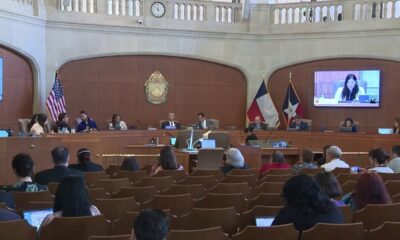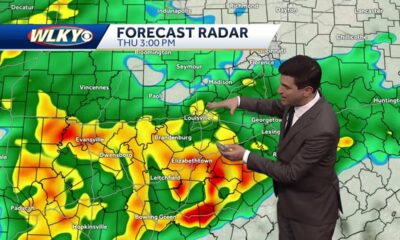News from the South - Alabama News Feed
Bell-to-bell cell phone ban moves in House and Senate committees
Bell-to-bell cell phone ban moves in House and Senate committees
by Anna Barrett, Alabama Reflector
February 27, 2025
The House and Senate education policy committees approved identical bills on Wednesday that would ban cell phones in public K-12 schools from “bell to bell.”
SB 92, sponsored by Sen. Donnie Chesteen, R-Geneva, and HB 166, sponsored by Rep. Leigh Hulsey, R-Helena, requires all local school boards to develop and implement cell phone policies that require students to store devices for the entirety of the school day. Pike Road Junior High Principal Christy Wright told lawmakers about her school’s cell phone ban using Yondr pouches.
“Without cell phones being there, it was clear that there was much more peer interaction happening, deeper discussions. Even just in the hallways, the interaction between our students changed our culture some,” Wright told the Senate Education Policy Committee Wednesday. “They also noticed, obviously, more in-depth instructional time, more academic engagement, and also just an overall confidence in our students.”
Wright said the school got the pouches through a grant, but if one is damaged or lost, students must pay for the $30 pouch to be replaced. She said students turn off their phones and place them in the pouches and lock them with a magnet as they enter the building. They cannot access the magnet again until the end of the school day, she said, with exceptions for emergencies.
“If there is an emergency, the parent is to call the front office. The front office immediately gets in touch with the child,” Wright said.
Sen. Rodger Smitherman, D-Birmingham, expressed concern on how school districts would afford storage for cell phones.
“I represent two to three largest school systems in the whole state of Alabama, that is Jefferson County and Birmingham. We’re talking about thousands of students,” Smitherman said.
Although Pike Road Junior High School uses Yondr pouches, the legislation does not dictate how devices will be put away. That is left to the discretion of local school boards, according to the bill.
“It could be stored in a locker, car or similar storage device, and that’s simply up to the local boards of education as to what they basically can afford,” Chesteen said.
State Superintendent Eric Mackey said in early February there are about 20 school districts that have a total ban.
“It is also not just dealing with the cell phones — which I call supercomputers in a student’s pocket — but it’s really talking about social media, and that is the issue,” Mackey said on Feb. 13. “We can’t lose sight that the issue is not the device.”
Alabama Department of Mental Health Commissioner Kimberly Boswel spoke to the House Education Policy Committee about how cell phones and the use of social media affect youth anxiety, depression and self harm.
“We saw depression increase from 2010 to 2020, 145% in girls and 161% in boys,” Boswel said.
She said social media causes social deprivation, sleep deprivation, attention fragmentation and addiction.
“We have shifted from the play-based childhood that we all experienced to a phone-based childhood,” Boswel said. “What we want to get back to is connection and community, and really helping our kids be as mentally healthy as they can be.”
According to a study by the University of California, it takes about 23 minutes and 15 seconds to regain focus after a distraction. Adrianna Harrington, managing director of policy for ExcelinEd, applied this information to a student receiving a mobile notification while in school. She said 50% of students get 240 notification per day.
“If you do the math, it’s not mathing,” Harrington said. “You can’t focus.”
In addressing concerns of safety, including school shootings, Hulsey told the House committee that school resource officers are supportive of cell phone bans. According to a consulting company for school safety, cell phone use can escalate an emergency by overloading emergency services and distracting students from the emergency itself. In addition, contact with parents can cause unnecessary crowds during an emergency.
But the legislation includes exceptions for when a student can access and use their devices. Hulsey said under the legislation cell phones could be used in emergency situations, by students with Individualized Education Plans and Section 504 plans, and when necessary for instructional purposes.
The legislation also requires an annual survey for compliance and implementation. Starting in the 2026-27 school year, schools that fail to achieve the minimum compliance must give up 30% of their common purchase funds, Hulsey said. Though Hulsey said she would be OK with more punitive measures.
“I think this is a fair compromise,” she said.
The legislation also requires an internet safety education program to be completed before a student starts eighth grade. Chesteen said the State Board of Education would be responsible for creating the program on the risks and benefits of social media.
Mackey said he would create an internet safety course even if the bills did not pass.
“We’re already beginning those discussions in anticipation that the bill passes,” he said on Feb. 13. “I would say if the bill doesn’t pass, we’re still going to do it. It just won’t have the force of law behind it.”
Both bills received unanimous approval. HB 166 will now go to the full House, and SB 92 will go to the full Senate.
Alabama Reflector is part of States Newsroom, a nonprofit news network supported by grants and a coalition of donors as a 501c(3) public charity. Alabama Reflector maintains editorial independence. Contact Editor Brian Lyman for questions: info@alabamareflector.com.
The post Bell-to-bell cell phone ban moves in House and Senate committees appeared first on alabamareflector.com
News from the South - Alabama News Feed
Alabama immigration enforcement bill gets approval from 2nd House committee
by Ralph Chapoco, Alabama Reflector
April 3, 2025
An Alabama House committee Wednesday approved an immigration bill that had already received another committee’s approval earlier in the session.
The House Judiciary Committee approved HB 7, sponsored by Rep. Ernie Yarbrough, R-Trinity, which would give local law enforcement the authority to enforce the country’s immigration laws.
“There are no new laws added,” Yarbrough said to committee members during the meeting. “It simply allows that partnership to take place just to address safety in our communities.”
GET THE MORNING HEADLINES.
Judiciary approved the bill about six weeks after the House Public Safety and Homeland Security did so in February. It is unusual for a bill to go through two committees before going to the floor of the House for a vote. The last major legislation to get routed through two House committees was the bill legalizing medical cannabis in Alabama in 2021.
The current bill, largely unchanged from last year, allows local law enforcement, such as sheriff’s offices and police departments, to enter into agreements with federal agencies to arrest and detain people who are not legally authorized to reside in the country.
Once in custody, deputies and police officers must then attempt to determine a person’s immigration status and get the help of an interpreter to determine someone’s nationality.
If a person cannot provide documentation proving they are eligible to live in the country, local law enforcement may then reach out to a Law Enforcement Support Center (LESC) to get information about a person’s immigration status.
The bill states that people cannot be detained solely because of their immigration status unless authorized by Immigration and Customs Enforcement, and that sheriffs’ deputies and police departments will verify that a person has an arrest warrant within 24 hours of the person getting detained.
Law enforcement must also obtain documents to verify a person’s immigration status, bet that a passport or a permanent resident card.
House Judiciary Committee members approved an amendment making a few of the requirements optional. A previous version required the Alabama Attorney General’s Office to publicly name any agency failing to comply with provisions in the legislation and notify the governor’s office.
The updated language gives the AG’s Office an option to inform the Governor’s Office.
Another amendment also allows, but doesn’t require, local law enforcement to report the total number of people arrested and the number of foreign nationals they take into custody as well as the inquiries they make to the LESC.
Immigration advocates who spoke at a public hearing on the legislation in March said the legislation is creating fear among immigrant communities. That, they said, would lead to mistrust toward law enforcement and increased school truancy for children of immigrants who are afraid to attend school for fear of their parents being deported.
Democrats on the House Judiciary Committee criticized the legislation.
“What country do we border in Alabama?” asked Rep. Penni McClammy, D-Montgomery during the committee meeting Wednesday.
Yarbrough said that every state is connected, and that people travel.
“Each state doesn’t have a physical wall, so people travel from state to state,” Yarbrough said.
YOU MAKE OUR WORK POSSIBLE.
Alabama Reflector is part of States Newsroom, a nonprofit news network supported by grants and a coalition of donors as a 501c(3) public charity. Alabama Reflector maintains editorial independence. Contact Editor Brian Lyman for questions: info@alabamareflector.com.
The post Alabama immigration enforcement bill gets approval from 2nd House committee appeared first on alabamareflector.com
News from the South - Alabama News Feed
New Tariffs Could Raise Car Prices | April 2, 2025 | News 19 at 10 p.m.
SUMMARY: A 25% tariff on foreign cars and auto parts is set to take effect at midnight, potentially raising prices for consumers. While current inventory and cars already at U.S. ports will remain at existing prices, future pricing remains uncertain. Dealerships in North Alabama say it’s too early to know the full impact, but warn that repair costs may also rise due to higher parts prices. Some manufacturers may absorb part of the tariff, while others could pass the full cost to buyers—raising a $30,000 car to nearly $40,000. Dealerships report a recent surge in buyers trying to purchase before prices rise.

A 25% tariff on any foreign cars or auto parts will go into effect in a couple of hours.
News 19 is North Alabama’s News Leader! We are the CBS affiliate in North Alabama and the Tennessee Valley since November 28, 1963.
https://whnt.com/
https://www.facebook.com/whntnews19
https://www.instagram.com/whntnews19/
https://twitter.com/whnt
News from the South - Alabama News Feed
Weather Fun 1on1: Brylee explains why thunderstorms occur more often in the summer than in the wi…
SUMMARY: Meteorologist Brylee Brown explains why thunderstorms are more common in summer than winter in her “Weather Fun 1-on-1” segment. Joined by Aidan, they conduct an experiment using two bowls of air at different temperatures. The warm air inflates a balloon, demonstrating that warm air is less dense and rises, while cold air causes the balloon to deflate. This principle helps explain why summer afternoons often bring air mass thunderstorms, as humid, warm air is abundant. In winter, less warm air means these storms are rare. For more weather science resources, viewers can scan a QR code or visit the website.

Weather Fun 1on1: Brylee explains why thunderstorms occur more often in the summer than in the winter
Subscribe to WVTM on YouTube now for more: https://bit.ly/2jvAaUD
Get more Birmingham news: http://www.wvtm13.com
Like us: https://www.facebook.com/WVTM13/
Follow us: https://twitter.com/WVTM13
Instagram: https://www.instagram.com/wvtm13/
-

 Mississippi Today1 day ago
Mississippi Today1 day agoPharmacy benefit manager reform likely dead
-

 News from the South - Alabama News Feed7 days ago
News from the South - Alabama News Feed7 days agoSevere storms will impact Alabama this weekend. Damaging winds, hail, and a tornado threat are al…
-

 News from the South - Alabama News Feed6 days ago
News from the South - Alabama News Feed6 days agoUniversity of Alabama student detained by ICE moved to Louisiana
-

 News from the South - Oklahoma News Feed5 days ago
News from the South - Oklahoma News Feed5 days agoTornado watch, severe thunderstorm warnings issued for Oklahoma
-

 News from the South - Virginia News Feed6 days ago
News from the South - Virginia News Feed6 days agoYoungkin removes Ellis, appoints Cuccinelli to UVa board | Virginia
-

 News from the South - Kentucky News Feed7 days ago
News from the South - Kentucky News Feed7 days agoA little early morning putting at the PGA Tour Superstore
-

 News from the South - Georgia News Feed5 days ago
News from the South - Georgia News Feed5 days agoGeorgia road project forcing homeowners out | FOX 5 News
-

 News from the South - West Virginia News Feed6 days ago
News from the South - West Virginia News Feed6 days agoHometown Hero | Restaurant owner serves up hope








































